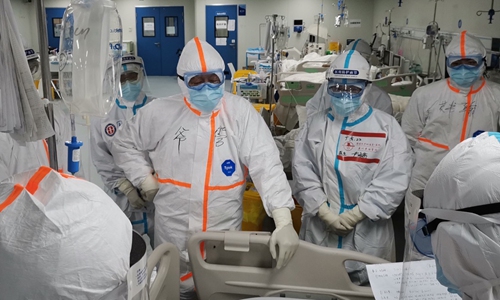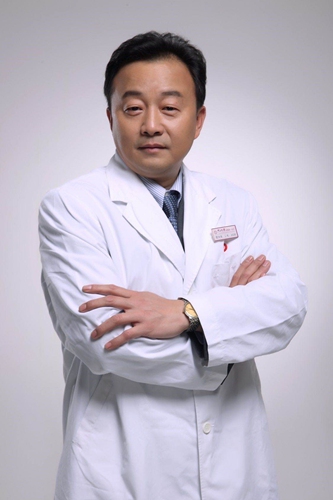Chinese ICU expert helps quell both outbreaks in Wuhan and Suifenhe
By Li Qiao Source:Global Times Published: 2020/5/14 21:37:58

Guan Xiangdong guides the treatment of severe COVID-19 patients at Wuhan Leishenshan Hospital in early April. Photo: Courtesy of Guan Xiangdong
With the last four of the 409 imported COVID-19 patients at Suifenhe port, Northeast China's Heilongjiang Province cured and discharged from hospital on Tuesday afternoon, top intensive care expert Guan Xiangdong's anti-epidemic battle at Suifenhe was victorious. Not one of the 39 critical patients died.
Although some local cases were reported in Shulan, Northeast China's Jilin Province and Wuhan recently, Guan said the possibility of a second outbreak in Suifenhe is unlikely due to the establishment of the integrated and strict national epidemic prevention and control system. Guan told the Global Times he is on call to offer his support without hesitation. Where there is the need to save lives, there will be intensive care doctors, he said.
Guan, 58, is director of the department of critical care medicine of The First Affiliated Hospital, Sun Yat-sen University in Guangzhou, South China's Guangdong Province. In 2005, he became one of the first doctoral supervisors of critical care medicine in China. He has been working for 32 years, leading and witnessing the development of critical care medicine in China. Guan, with other ICU experts supporting Wuhan, wrote the Diagnosis and Treatment Protocol for COVID-19 Critical Cases and Severe Critical Cases, which guided frontline doctors treating critical patients all over the country.

Guan Xiangdong Photo: Courtesy of Guan Xiangdong
Rush to Suifenhe
On February 2, Guan went to Wuhan to guide treatment for critical COVID-19 patients as an expert of the National Health Commission. He returned to Guangzhou on April 7. After resting for less than four days, Guan was assigned to support Suifenhe port bordering Russia on April 11, when the city's cases were increasing.
Different from the uneasy mood he recalls from his service in Wuhan, Guan was full of confidence on his way to Suifenhe. He had acquired knowledge of the virus from accumulated experience in Wuhan. The high level of national concern has provided solid support for Suifenhe's epidemic prevention efforts, Guan noted.
In the first two days of Guan's stay in Heilongjiang Province, he traveled around Suifenhe and Mudanjiang, more than 160 kilometers away from Suifenhe, to investigate patients' conditions. Guan introduced the Wuhan experience of stratified treatment to Suifenhe.
The People's Hospital of Suifenhe admitted and treated asymptomatic cases. Critical and severely critical patients were transferred to Mudanjiang Hongqi hospital, while mild and ordinary cases were admitted to Mudanjiang Kang'an Hospital. Guan guided the treatment in the three hospitals.
Guan suggested more ICU beds, medical equipment and medical staff should be immediately provided to make more preparations for the possible arrival of patients. "We should try to estimate the number of cases as much as possible," Guan said.
Two mobile P3 laboratories, which can test more than 1,000 samples per day, were set up in Suifenhe port and Mudanjiang city. Imported cases in Suifenhe were easy to isolate and test, with low risks of community spreading, he said, adding that patients were mostly adults with the average age about 40 years old. They were cured relatively easily, said Guan.
"There are more than 4,000 beds in Suifenhe and Mudanjiang for imported cases, which ensures the treatment of all patients," Guan said.
He said the day-by-day increasing confidence in his heart while working in Suifenhe made him believe that a second outbreak there is unlikely to occur.
Wish in Wuhan
Guan's confidence was accumulated through struggle as doctors initially knew little about the novel coronavirus in Wuhan. "The patient can give me the thumbs up in the morning but die suddenly in the afternoon," Guan recalled from his days in Wuhan. Guan said he hadn't come across such a strange virus in his life.
The blood oxygen saturation of normal people is above 98 percent and general patients with low blood oxygen will appear purple. However, some patients infected with COVID-19 whose blood oxygen saturation is as low as 50 percent to 80 percent still do not become purple, do not breathe quickly, and can still talk normally. But the patient may suddenly lie down on the ground and die even when just going to the bathroom. This condition, called "silent hypoxemia," made it difficult for doctors to diagnose the patient's severity, Guan explained.
In combination with clinical observation and research, Guan emphasized that critical patients with respiratory failure should be intubated as soon as possible. "It may increase the risk of infection for medical staff, but we can buy more treatment time for patients and reduce the mortality rate," he said.
While Guan as an ICU expert is used to confronting death, every death in Wuhan hit his heart greatly. Guan remembered the sullen sky and big snowfall in Wuhan on February 14. "It was around the epidemic peak and I felt so sad and disappointed as many critical patients died in that period," he said.
In Wuhan Union West Hospital, Guan saw a young nurse squatting by the staircase to have a meal. He recalls his heart filled with empathy for the hard work and persistence of frontline medical staff. That night, Guan wrote lyrics named I wish back at the hotel in two hours and asked his friend to turn it into a song.
"I wish to keep life on fire, let life shine in the sun. No matter how hard it is, I will be with you," Guan wrote.
Guan served as director of the arts department from elementary school to graduate school. "I love music. To express my feeling in the lyrics is also my way to relieve pressure in Wuhan," he said.
Guan said he wished for the song to inspire frontline medical staff, so he invited around 22 medical staff working in Wuhan, from experienced experts to young nurses, to record the song with their mobile phones. "A nurse burst into tears when she read my lyrics," he said.
Guan recommends that due to the epidemic, the country will pay more attention to the development and construction of critical care medicine.
As imported cases have been cleared in Suifenhe, Guan is waiting for a national order to return home. "I miss my Piggy a lot and am expecting to play with him again after more than 100 days away from home," Guan said. Piggy is an 8-year-old golden retriever.
"However, if there are any critical patients in need, I am ready to go to the front anywhere at any time," Guan noted.
Newspaper headline: Double victory
RELATED ARTICLES:
Posted in: PROFILE